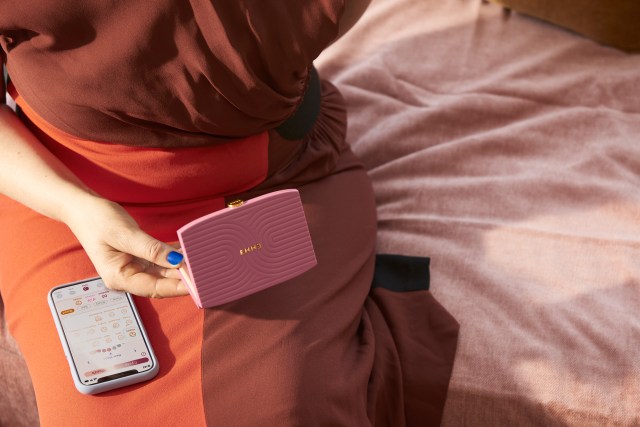
When it comes to women’s health, especially reproductive healthcare, what has become vividly clear under the Trump administration is that our rights seem to be constantly up for debate and scrutiny. That’s in the political realm, although this can change with new leadership, and here’s hoping it does.
But what has also become very clear in the tech world, is that innovation is a key to progress and giving women power to make decisions about their own lives and bodies. The term “femtech” is becoming more and more familiar because of the products being offered and apps being developed by companies taking advantage of the need.
One of these products is Emme, a femtech company that is revolutionizing birth control with the first smart connected pill case for birth control pill management. The co-founder and CEO of Emme, engineer Amanda French, is the type of innovator and leader we need to see more of. Amanda has over a decade of experience bringing innovative products to the market with a particular focus on women’s health. One of the first innovations Amanda helped develop was a product that facilitated the distribution of antiretrovirals to mothers in the developing world to prevent the rates of HIV transmission from mother to child postpartum. This product was recognized directly by Hilary Clinton and won USAID’s Saving Lives at Birth Grand Challenge.
Prior to founding Emme, Amanda developed breakthrough heart valve technology as an R&D engineer with Edwards Lifesciences, where she also held roles in program management, manufacturing, and marketing through the Technical Development Program. Amanda went on to develop state-of-the-art hearing aids at Earlens. Amanda brings her prior experience of developing innovative medical technology to drive the advancement of innovation in women’s health at Emme.
We spoke with Amanda about Emme and why she is passionate about empowering women to take back the control of their reproductive health.

When did you first become interested in creating medical technology?
I’ve always loved math and science, and growing up I knew I wanted to apply my interest in STEM towards helping people. Specifically, I was interested in finding a way to work in the field of healthcare while applying my creative talents and passion for math.
In high school, I became aware of the fields of mechanical and biomedical engineering – in particular, I remember attending a lecture about neural prosthetics during a college visit and being amazed at the role engineering innovation can play in advancing healthcare. At that moment, I knew I wanted to dedicate my career to medical device innovation. It also made me realize that there is an opportunity to educate girls about engineering opportunities earlier in life. I know mechanical engineering is an incredible field for women, but many people don’t become aware of the field until high school, college, or even later.
Where did your focus on women’s health in particular stem from?
At Stanford Biodesign I had the opportunity to observe hundreds of unmet needs at Stanford’s hospital and clinics. I interviewed and surveyed hundreds of women, and also observed that many of the tools for women’s health had not evolved in decades. I knew many of these problems could be addressed with new technology, which ultimately influenced the founding of Emme.

Prior to much of your groundbreaking work here in the US, you worked overseas developing a product to help deliver medication to HIV infected pregnant women. What were some of the most impactful things you learned from this period?
My work developing global technology with Engineering World Health and the Developing World Healthcare Technology Lab at Duke University was incredibly eye-opening. In addition to the products I helped develop, I also spent time living on-site at a hospital in Nicaragua to repair medical equipment. The most important lesson from this period is that it is important to truly listen to and understand the needs of the people you are serving, without preconceived notions.
Many organizations, thinking that the need is more equipment, donate used and broken medical equipment overseas, which is often difficult to repair, understand, and use. In the case of the Pratt Pouch for the prevention of mother-to-child HIV transmission, we understood that the unmet need was around access to medication and proper dosing (for many mothers postpartum, the pharmacy was too far away to reach in time for the medication to be effective), and therefore we developed a simple solution to facilitate distribution of antiretrovirals through single dose packets that could be available to mothers at the time of delivery.

How did the idea for Emme come about and what is the mission of the company?
In 2016, after developing medical devices in the heart valve and hearing aid spaces, I became a fellow at the Stanford Byers Center for Biodesign. During my time at the Innovation Fellowship, I had the opportunity to observe hundreds of unmet needs at Stanford’s hospitals and clinics, and I was surprised by the lack of innovation in women’s health. I heard from hundreds of women about the stress and consequences they experience as the result of missing birth control pills – the most common form of contraception. Once I realized that the most common problem for the most popular form of contraception had not been solved, I realized there was a major opportunity to make an impact with modern technology, which led to the invention of the Emme Smart Case. At Emme we are focused on offering tools and services to empower women and to control their health experience; our mission is to put women’s health in women’s hands.
Our current political environment under a government that is bent on taking away especially reproductive care, coupled with COVID-19 making certain types of care inaccessible has led to a perfect storm. How can companies like Emme revolutionize the landscape we find ourselves in?
We believe that birth control is essential health care, and we are proud to partner with Planned Parenthood as a Business for Birth Control. Overall, it’s been established that every dollar spent on family planning returns meaningful cost savings to the US healthcare system. At Emme, we are building a community of fierce advocates for all women, all bodies, and all choices, and we encourage everyone to stand up for their beliefs and fight for their rights.
Birth control is always harder for low-income women to access due to socio-economic factors as well as restrictive policies. How is Emme hoping to bridge that gap?
Our team, board, and investors are experienced innovators in the healthcare space, and we recognize the importance of reimbursement for the pill and affordable access for those who do not have insurance. Access to information and education is a major obstacle, so we offer our pill and health tracking app for free to all users. Our app provides resources based on guidelines from CDC to help users access information about how to manage missed pills and when to use backup contraception. We are working towards insurance coverage for the Emme Smart Case in the future, and we are also developing partnerships to achieve broader accessibility for the pill – more details on that to come soon!
On your website it states that the mission is to put “women’s health in women’s hands”. Can you explain more what this means to you as a founder and innovator?
I believe that women deserve the best possible healthcare experience – one that is backed by science and driven by choice. Historically, there have been gaps that have prevented this from being achieved – the inclusion of women in clinical trials was not required until 1992, meaning that much of the past medical understanding and conclusions for women have been extrapolated from male-only studies. There has also been an absence of cutting-edge tools in women’s health, due to a combination of limitations in technology, research, and understanding of the most pressing unmet needs. To me, putting women’s health in women’s hands means putting women in the driver’s seat of their health experience by offering the best possible tools, information, and access.

Why is birth control so fundamental to many women’s lives and freedoms?
The birth control pill plays a fundamental role on many levels. More than 50% of people on the pill use the pill for therapeutic benefit beyond contraception, and therefore it is an important medication for improving quality of life overall. Importantly, the pill is one of the least expensive and most effective forms of contraception, which enables millions of women to avoid pregnancy until they are ready.
How is femtech and women’s healthcare in particular received in the technology landscape?
There are so many opportunities to drive innovation in women’s health through new technology. I am encouraged to see that femtech and women’s health are on the rise – the category continues to gain increased recognition and funding each year, which is so important for the health and wellness of women. Women drive 80% of healthcare decisions for their families, so it makes a lot of sense to create a healthcare experience that is centered around the needs of women, who are powerful and important stakeholders for not only their health but also the health of their families.
What pushback, if any, have you received, and how do you counter it?
Despite the clear statistics on the size and opportunity of the women’s health market (most obviously – women are more than 50% of the population), I do encounter people who think that women’s health is a niche field, or who have the mis-perception that the unmet needs in women’s health are already solved. The most common misunderstanding is that the pill experience is already perfected or that women don’t need better options, even though the pill has a 9% failure rate and women describe pill adherence as their biggest stressor on the pill. It’s hard to think of another product category where a 9% failure rate would be deemed acceptable, so I counter this pushback by focusing on the loud and clear voices of the women we serve, and by aligning the company with partners who are passionate about changing the status quo in women’s health.
How would you sum up what an “empowered woman” looks like and what that term means?
The term empowered woman is so important to me – in fact, the word empowered inspired the name Emme, and our hashtag is #emmepowered. To me, being empowered means having the confidence and freedom to live boldly on your own terms. Our aim with the Emme Smart Case is to contribute to an experience and lifestyle where women are able to live an empowered life, without the distraction, stress, fear, or impact of missed pills.


















3 thoughts on “Femtech CEO Putting Women’s Health In Women’s Hands By Revolutionizing Birth Control”
Comments are closed.